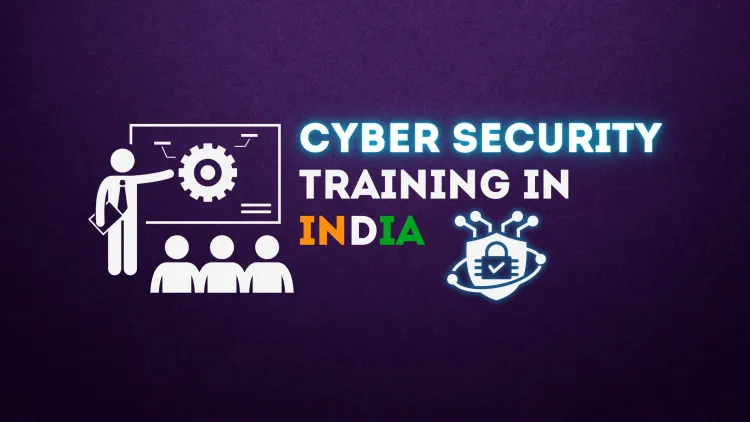Am I Eligible for a Cyber Security Course? Complete Guide for Indian Students
The eligibility for cybersecurity courses in India varies by program type, with certificate and diploma courses open to Class 10 or 12 students from any stream, requiring basic computer skills. Undergraduate programs (BTech/BSc) generally require a Class 12 qualification in the science stream, while postgraduate programs (MTech/MSc) require a related bachelor’s degree. Professional certifications like CISSP and CEH are accessible to all but are best suited for those with technical knowledge or work experience. Institutes such as WebAsha Technologies, NIIT, and IITs offer diverse training programs, catering to beginners and professionals. Essential skills include networking, programming, and problem-solving, with cybersecurity offering lucrative career opportunities and growing demand.

In the digital age, cybersecurity has become a critical field to protect sensitive data and networks. With the rising demand for skilled cybersecurity professionals, many students and professionals in India are exploring cybersecurity courses. However, understanding the eligibility criteria for these courses is essential to determine the right pathway.
What is Cyber Security?
Cybersecurity refers to the practice of safeguarding systems, networks, and data from unauthorized access, attacks, or damage. It involves a combination of tools, techniques, and protocols to secure sensitive information and ensure the integrity of digital systems.
Cybersecurity professionals play a crucial role in identifying vulnerabilities, preventing cyberattacks, and maintaining digital safety in organizations.
Types of Cyber Security Courses in India
1. Certificate Courses
- Short-term programs focusing on specific cybersecurity skills.
- Examples: Ethical Hacking, Network Security, Penetration Testing.
2. Diploma Courses
- Comprehensive programs offering foundational knowledge in cybersecurity.
- Examples: Diploma in Cyber Security, Advanced Diploma in Ethical Hacking.
3. Undergraduate Programs (BTech/BSc)
- In-depth programs combining theory and practical applications.
- Examples: BTech in Cyber Security, BSc in Information Security.
4. Postgraduate Programs (MTech/MSc)
- Advanced courses for specialization in areas like cryptography or forensics.
- Examples: MTech in Information Security, MSc in Cyber Forensics.
5. Professional Certifications
- Globally recognized certifications for career advancement.
- Examples: CISSP, CEH, CompTIA Security+.
Eligibility Criteria for Cyber Security Courses in India
Certificate and Diploma Courses
- Minimum Qualification: Class 10 or 12 pass.
- Technical Skills: Basic knowledge of computers and networks.
- Preferred Background: Students from any stream (Science, Commerce, or Arts).
Undergraduate Programs
- Educational Qualification:
- Class 12 with a minimum of 50% aggregate marks.
- Science stream with subjects like Mathematics, Physics, or Computer Science is often preferred.
- Entrance Exams: Some institutes may require JEE Main or similar exams.
Postgraduate Programs
- Eligibility:
- Bachelor’s degree in Computer Science, Information Technology, or related fields.
- Minimum of 50% aggregate marks in undergraduate studies.
- Entrance Exams: GATE, university-specific exams, or direct admissions.
Professional Certifications
- Basic Requirement: No strict academic qualifications.
- Work Experience: Recommended for certifications like CISSP and CISM.
- Technical Knowledge: Understanding of networking, operating systems, and security basics.
Popular Cyber Security Institutes in India
| Institute | Courses Offered | Eligibility |
|---|---|---|
| WebAsha Technologies | Ethical Hacking, Penetration Testing | Open to all, basic technical knowledge |
| Indian School of Ethical Hacking | Diploma in Cyber Security, Ethical Hacking | 10+2 with a passion for cybersecurity |
| NIIT | Cyber Security Programs | Class 12 or equivalent |
| Amity University | BTech in Cyber Security | Class 12 with Science |
| IITs | MTech in Cybersecurity | Bachelor’s degree, GATE |
Skills Required for Cyber Security Courses
- Basic knowledge of computer systems and networks.
- Interest in problem-solving and critical thinking.
- Awareness of cybersecurity threats and trends.
- Ability to learn programming languages like Python or Java.
- Understanding of operating systems like Linux and Windows.
Conclusion
The eligibility criteria for cybersecurity courses in India vary based on the level of the program. Whether you’re a high school student or a working professional, there’s a cybersecurity course tailored to your background and career goals. With the increasing need for digital safety, now is the perfect time to explore a career in cybersecurity and contribute to a safer online world.
FAQs
-
What is the minimum qualification for a cybersecurity course?
- For certificate and diploma courses, the minimum qualification is Class 10 or 12.
-
Can a commerce student pursue cybersecurity?
- Yes, many cybersecurity courses are open to students from any stream.
-
Do I need coding skills to join a cybersecurity course?
- While coding skills are not mandatory for beginners, they are beneficial for advanced programs.
-
Which entrance exams are required for cybersecurity undergraduate programs?
- Some institutes require exams like JEE Main, while others have their own entrance tests.
-
Are there any short-term courses for cybersecurity?
- Yes, there are various certificate programs in ethical hacking, network security, etc.
-
What is the eligibility for professional certifications like CISSP?
- CISSP requires work experience and a strong technical foundation.
-
Can arts students enroll in cybersecurity programs?
- Yes, some programs and certifications are open to arts students as well.
-
Which universities offer postgraduate courses in cybersecurity?
- IITs, NITs, and other reputed universities offer MTech and MSc in cybersecurity.
-
Is cybersecurity a good career for the future?
- Yes, cybersecurity is a high-demand field with excellent growth prospects.
-
What skills are required for success in cybersecurity?
- Analytical thinking, problem-solving, programming, and knowledge of security tools.













![Top 10 Ethical Hackers in the World [2025]](https://www.webasha.com/blog/uploads/images/202408/image_100x75_66c2f983c207b.webp)
![[2025] Top 100+ VAPT Interview Questions and Answers](https://www.webasha.com/blog/uploads/images/image_100x75_6512b1e4b64f7.jpg)









